Protecting the rights of Indigenous peoples in resource management in the Philippines is essential for their survival and cultural identity. The Philippines has a rich history and diverse culture, much of which is preserved and passed down through generations by Indigenous peoples. Their role in resource management is crucial not only for their own well-being but also for the sustainable development of the country as a whole. Recognizing and upholding the role of indigenous communities in decision-making processes regarding natural resources is fundamental in ensuring the protection of their rights and the preservation of their cultural heritage. Without their active involvement, the delicate balance between development and conservation in the Philippines would be difficult to achieve.
There are about 9.4 million Indigenous individuals who face challenges that threaten their land and heritage. The Indigenous Peoples' Rights Act (IPRA) recognizes their rights, but only 20.5% of ancestral lands have legal recognition.
Indigenous leaders are important for sustainable resource management. They use Traditional Ecological Knowledge to help preserve biodiversity.
Organizations that advocate for Indigenous rights work to amplify their voices against exploitation.
Join us to learn more about the initiatives that support Indigenous rights and environmental justice.
Overview of Indigenous Rights
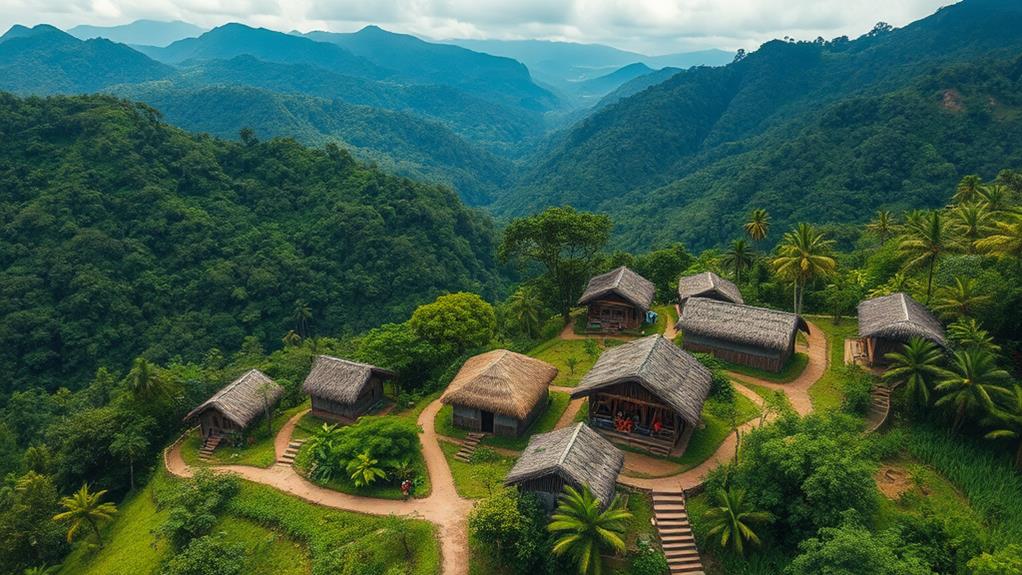
Respecting Indigenous rights means recognizing their ownership of ancestral lands and resources. In the Philippines, approximately 9.4 million Indigenous people face socio-economic issues because their land rights are often violated. The Indigenous Peoples' Rights Act (IPRA) was established in 1997 to affirm these rights, but only 20.5% of the country's land has received Certificates of Ancestral Domain Titles.
Honoring Indigenous rights requires more than just legal recognition; it's essential to empower these communities to manage their territories. Traditional ecological knowledge (TEK), which Indigenous peoples hold, is important for sustainable resource management and protecting biodiversity.
Unfortunately, industries like mining and logging continue to violate these rights, making it hard for Indigenous people to safeguard their land and resources.
Understanding Indigenous rights is crucial for reducing poverty and improving well-being. Sustainable resource management isn't only about protecting the environment; it's also about maintaining cultural identity, dignity, and the essence of Indigenous peoples' lives.
Historical Context and Legislation
Recognizing the rights of Indigenous peoples is important because it acknowledges their deep connection to the land. This recognition is influenced by a complicated history involving colonial actions and laws. The Indigenous Peoples' Rights Act (IPRA), passed in 1997, is a key law that supports Indigenous peoples' rights to their ancestral lands and their ability to govern themselves.
Despite this progress, there are still many challenges in securing Ancestral Domain Titles. One major issue is the Regalian Doctrine, a colonial law that asserts state ownership of all lands. This creates obstacles for Indigenous land rights. Currently, only 20.5% of the Philippines' land has been granted Certificates of Ancestral Domain Titles, highlighting the slow pace of legal recognition. Bureaucratic obstacles make it even harder for Indigenous peoples to exercise their rights.
Laws like the Strategic Environmental Plan (SEP) of 1992 and the Enhanced National Integrated Protected Areas System (ENIPAS) Law of 2018 attempt to promote sustainable development and protect natural resources.
However, these laws often ignore the important role that Indigenous peoples play in managing these resources. To empower Indigenous communities, we must address these historical injustices and support their rights in resource management.
Current Challenges Faced by Indigenous Peoples
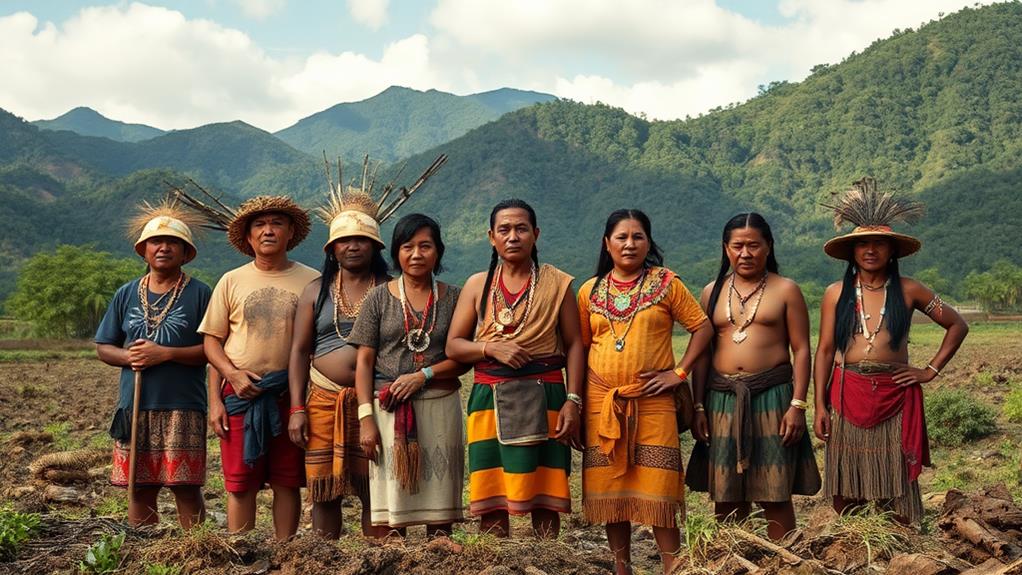
Indigenous communities in the Philippines face serious challenges due to systemic inequalities and historical injustices. There are about 9.4 million Indigenous Peoples, and 59% of them live in poverty, which is higher than the 52% of non-Indigenous people facing the same issue. Many Indigenous individuals struggle with limited access to education, which often prevents them from finishing school and contributes to ongoing poverty.
Food insecurity is another significant problem. Approximately 51% of Indigenous Peoples identify as food poor, compared to 45% of non-Indigenous individuals.
Additionally, the legal recognition of ancestral rights is crucial but happens at a slow pace. So far, only 20.5% of the country's land has received Certificates of Ancestral Domain Titles. This slow recognition affects cultural identity and threatens the ability to sustain livelihoods.
Furthermore, there are land management challenges and bureaucratic obstacles that make it hard for Indigenous communities to secure land titles. Local governments often find it difficult to navigate these issues, leaving communities at risk of conflict and poverty.
It's essential for efforts to be made to ensure that Indigenous rights are recognized so that these communities can thrive on their ancestral lands.
Importance of Traditional Ecological Knowledge
Traditional Ecological Knowledge (TEK) is vital for protecting nature and managing resources sustainably. Here are four important reasons why TEK is essential:
- Biodiversity Conservation: Indigenous communities play a key role in conservation by protecting 85% of critical biodiversity areas. Their knowledge helps maintain various plant and animal species.
- Resilient Ecosystems: TEK supports practices that make ecosystems stronger, especially in places where 80% of the world's biodiversity can be found. For example, traditional farming methods can improve soil health and crop yields.
- Cultural Significance: The Philippine ICCA Project recognizes Indigenous Community Conserved Areas (ICCAs) as important for preserving cultural landscapes and sacred sites. These areas hold deep meaning for local communities and their heritage.
- Effective Resource Management: Community-led efforts, such as reforestation and traditional fire management, show how TEK can improve the health of ecosystems and support local economies. These initiatives often lead to better soil quality and increased wildlife habitat.
TEK is crucial for both nature and people, directly linking Indigenous practices with environmental health and cultural identity.
Role of Indigenous Leadership in Conservation
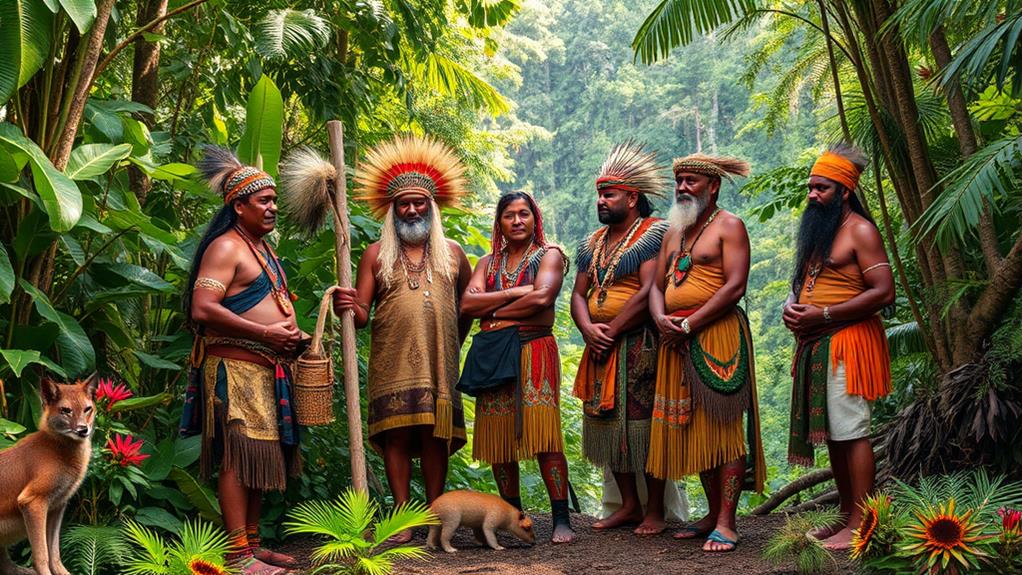
Indigenous leadership is crucial for conservation efforts globally. In the Philippines, Indigenous leaders empower their communities to manage their ancestral lands. The Indigenous Peoples' Rights Act (IPRA) of 1997 provides a legal framework that supports this self-determination. This law allows Indigenous leaders to start projects that protect biodiversity.
Over 150,000 hectares of Indigenous Community Conserved Areas (ICCAs) have been created, showing a strong commitment to sustainable resource management. By marking these areas, communities can use traditional ecological knowledge (TEK) to guide their conservation efforts. This combines ancient wisdom with modern practices.
The Bukluran ng mga Pamayanang Nangangalaga sa Kalikasan National ICCA Network illustrates the power of collaboration among Indigenous leaders. This unity helps them enforce their rights and manage natural resources effectively.
In a time of environmental challenges, Indigenous leadership is essential. Supporting these leaders in conservation isn't just important; it's necessary for a sustainable future.
Impact of Mining on Communities
Mining operations significantly disrupt local communities, especially Indigenous peoples. Here are some direct impacts:
- Clean Water Crisis: In Didipio, 80% of residents can't access clean water. The pollution in local rivers is eight times above safety standards.
- Food Insecurity: Mining leads to food poverty by damaging farmland and reducing water sources. This leaves communities hungry and vulnerable.
- Environmental Degradation: Mining harms ecosystems. For example, in Palawan, pollution threatens the Sabsaban river, which is crucial for irrigating 200 hectares of farmland.
- Human Rights Violations: Indigenous Tuwali communities experience intimidation and violence from companies like Oceanagold Corporation. This threatens their rights and safety.
These issues show the need for urgent action. The rights of Indigenous peoples to clean water, food security, and a healthy environment are essential.
Movements like the Save Nueva Vizcaya Movement highlight the importance of community awareness and support to tackle the damaging effects of mining. It's crucial to advocate for our communities.
Advocacy and Support Organizations
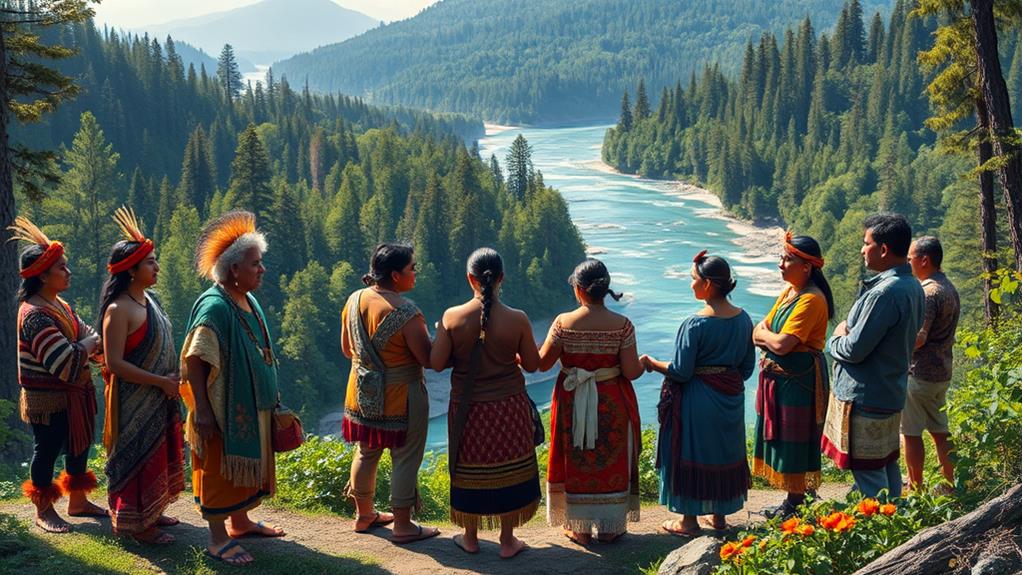
Indigenous communities face many challenges from resource exploitation, but there are organizations helping them. International Alert works with Indigenous peoples to include them in decisions about resource management. This helps to strengthen their voices and protect their rights.
The Environmental Legal Assistance Center (ELAC) engages community organizers to advocate for Indigenous concerns and promote sustainable management plans. This grassroots approach helps to highlight the needs of these communities.
Bukluran ng mga Pamayanang Nangangalaga sa Kalikasan National ICCA Network promotes collaboration among Indigenous groups to protect biodiversity and manage resources effectively.
Cultural Survival focuses on advocating for Indigenous rights, emphasizing self-determination and cultural preservation in resource management.
The Philippine ICCA Project, supported by the Department of Environment and Natural Resources (DENR) and the National Commission on Indigenous Peoples (NCIP), recognizes Indigenous Community Conserved Areas and highlights the importance of Indigenous knowledge in protecting biodiversity.
These organizations show how advocacy can help prioritize Indigenous rights in resource management across the Philippines.
Successful Indigenous-Led Initiatives
Indigenous-led initiatives are changing how natural resources are managed and showing the power of community solutions. These efforts have led to important achievements that help Indigenous communities and protect essential resources:
- More than 150,000 hectares of Indigenous Community Conserved Areas (ICCAs) have been created since 2016. These areas allow communities to manage and safeguard their natural resources.
- Around 50,000 people have benefited from ten new livelihoods that are both innovative and friendly to biodiversity. This shows the economic benefits of conservation led by Indigenous groups.
- The Bukluran ng mga Pamayanang Nangangalaga sa Kalikasan National ICCA Network has encouraged teamwork among Indigenous communities. This collaboration strengthens their efforts to conserve biodiversity.
- The ENIPAS Law of 2018 gives legal recognition to ICCAs. This law supports the rights of Indigenous Peoples to manage their ancestral lands.
These successful initiatives highlight the strength of Indigenous communities and their important role in keeping ecosystems healthy.
Supporting these actions ensures that Indigenous Peoples can continue to lead in sustainable resource management.
Corporate Accountability and Responsibility
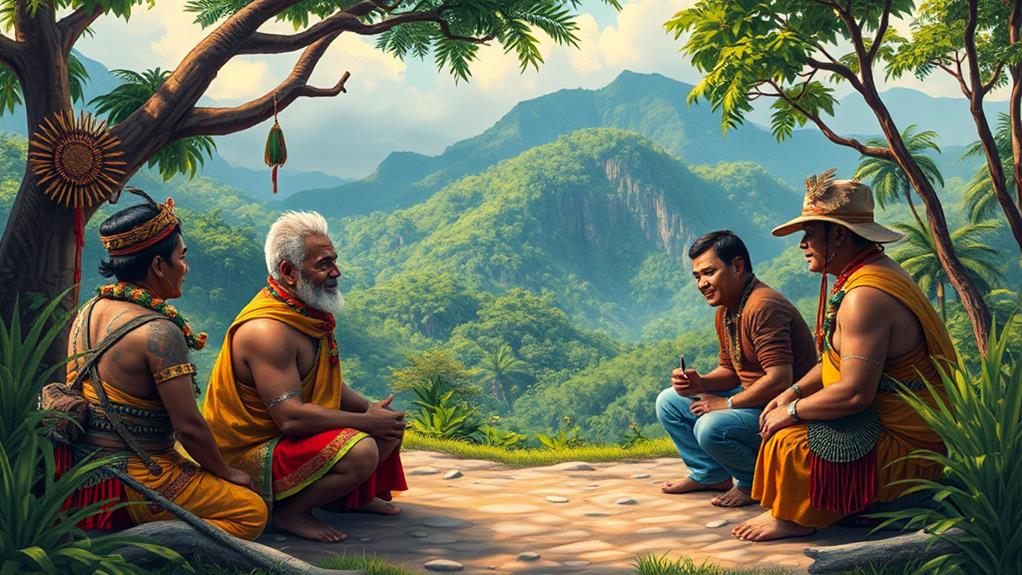
Corporate accountability in resource management is very important. For example, Oceanagold Corporation has been accused of human rights violations. These allegations include not getting proper consent from local communities for mining and causing pollution that threatens local water supplies.
In the Philippines, environmental defenders often face serious dangers. Those who speak out against companies like Oceanagold can put their lives at risk. Critics say that Oceanagold's efforts to engage with local communities aren't genuine. They emphasize a lack of real communication with Indigenous peoples.
International groups are asking for independent investigations into these issues. Experts from the United Nations highlight that corporate accountability is essential, not optional.
Despite recognition of these violations by national bodies, Oceanagold continues its operations without proper accountability measures in place. This situation shows the urgent need for companies to take responsibility for how they manage natural resources.
It is crucial for corporations to respect Indigenous rights. Companies must prioritize the voices and rights of local communities over profits. This approach will help ensure a more sustainable and fair future for everyone.
Future Directions for Indigenous Rights
Advocacy for Indigenous rights is crucial as communities face serious challenges that limit their access to essential services and land. In the Philippines, approximately 9.4 million Indigenous Peoples are striving for recognition.
Here are important future steps we must take:
- Empower Indigenous Leaders: We must strengthen local Indigenous leaders to boost advocacy. When leaders are empowered, they can effectively represent their communities and participate in decision-making.
- Accelerate Land Rights Recognition: The process for recognizing Certificates of Ancestral Domain Titles needs to be faster. Quick legal recognition of ancestral lands is key to improving the welfare of Indigenous communities.
- Standardize Data Collection: We need to improve how we collect data by creating standardized guidelines. This will include Indigenous indicators in national surveys, helping us understand the unique needs and diversity of Indigenous populations.
- Enhance Infrastructure: Improving roads and communication in Indigenous areas is essential. Better infrastructure supports development while helping to maintain cultural identity and manage resources sustainably.
Questions and Answers
What Is the Protection of Indigenous People's Rights in the Philippines?
Indigenous people's rights in the Philippines focus on protecting their land, culture, and communities. Land rights are essential because many indigenous groups have lived on their ancestral lands for generations. For example, the Indigenous Peoples Rights Act (IPRA) of 1997 helps these groups claim their territories legally.
Cultural preservation is another important aspect. Indigenous communities aim to keep their traditions and languages alive. Programs and initiatives are in place to support cultural education and the passing down of traditional practices.
Community engagement is crucial for empowering indigenous peoples. Strong legal support allows them to participate in decision-making about their resources. For instance, local councils often include indigenous representatives to ensure their voices are heard.
How to Preserve Indigenous Culture in the Philippines?
To preserve Indigenous culture in the Philippines, it is important to take specific actions. First, you should champion cultural heritage preservation by supporting festivals and events that celebrate Indigenous traditions. For example, attending the Kalinga's Bodong Festival helps keep their customs alive.
Second, promoting sustainable practices is crucial. This means encouraging the use of traditional farming methods that do not harm the environment. For instance, the Ifugao rice terraces are a great example of sustainable agriculture that also showcases Indigenous knowledge.
Third, it is essential to support community-led initiatives. This could involve helping local groups that work to teach younger generations about their culture. Programs that teach traditional crafts or storytelling can be beneficial.
Lastly, you must protect traditional knowledge by documenting and sharing it. Recording oral histories and traditional practices can help ensure they are not forgotten. For example, creating a digital archive of Indigenous tales can preserve their stories for future generations.
Your involvement in these areas will help ensure vibrant Indigenous cultures thrive for years to come.
What Is the Importance of IPS in the Philippines?
Indigenous Peoples in the Philippines are vital to the country's cultural heritage. They assert land sovereignty, which means they aim to control and protect their ancestral lands. This helps preserve their unique traditions and way of life. Their traditional knowledge includes practices like farming and herbal medicine, which promote sustainable practices. For instance, they use crop rotation and natural pest control to maintain soil health and biodiversity. By recognizing their role, we can support a harmonious balance between people and nature, benefiting both the environment and local communities.
How Can We Protect Indigenous Rights?
To protect Indigenous rights, it is important to focus on land rights. This means creating strong laws that support Indigenous ownership of their traditional lands. For example, countries like Canada have implemented legal frameworks that recognize Indigenous land claims, allowing communities to regain control over their territories.
Another key aspect is community engagement. This involves working directly with Indigenous communities to understand their needs and perspectives. For instance, when planning new developments, some cities hold meetings with Indigenous groups to ensure their voices are heard and respected.
Lastly, we must honor cultural heritage. This includes recognizing and preserving Indigenous traditions, languages, and practices. For example, educational programs that teach Indigenous history can help promote understanding and respect among all groups.